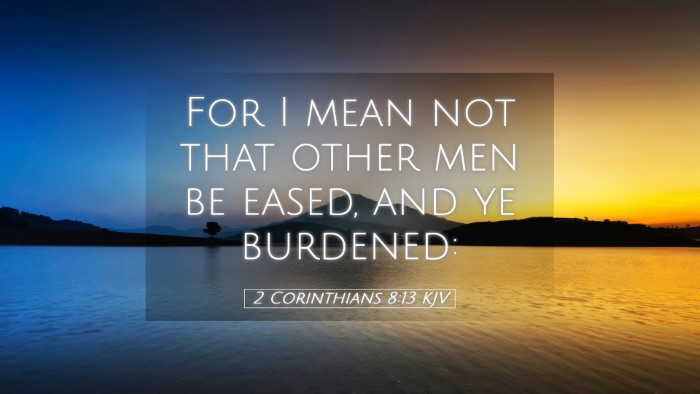Commentary on 2 Corinthians 8:13
In 2 Corinthians 8:13, the Apostle Paul addresses the church in Corinth regarding the principles of giving and the mutual support among believers. His instruction here unfolds the theology of generosity and the principle of equity in the body of Christ.
Text of the Verse
2 Corinthians 8:13: "For I do not mean that others should be eased and you burdened."
Overview and Context
This verse appears within the larger context of Paul’s discussion on the collection for the saints in Jerusalem. He encourages the Corinthian church to participate in this act of generosity voluntarily. The passage highlights the balance of contribution, emphasizing not only the act of giving but also the corresponding responsibilities of unity and care within the church.
Insights from Public Domain Commentaries
Matthew Henry’s Commentary
Matthew Henry emphasizes the problem of disparity in the early church. He notes that Paul is not suggesting an equal division of resources, but rather an equitable approach where the richer members support the poorer without creating undue hardship. He asserts that the aim of giving is not to cause distress but to ensure that no member of the church suffers lack while others are considerably blessed. Henry points to the importance of a selfless attitude in giving, one that reflects Christ’s love and grace.
Albert Barnes’ Notes on the Bible
Albert Barnes elaborates on the practical implications of Paul’s instructions. He argues that Paul speaks against any imposition on the Corinthians that would lead to significant burdens while attempting to relieve others. Barnes highlights that giving should stem from a place of willingness rather than obligation or pressure. He clarifies that the heart of giving in the Christian community is grounded in mutual concern and love, advocating for a spirit that seeks the welfare of others rather than merely fulfilling a duty.
Adam Clarke’s Commentary
Adam Clarke provides a thorough examination of the cultural and economic factors at play. He suggests that Paul’s message is a call for balance — the call to generosity should not result in the impoverishment of the donor. Clarke notes that Paul stresses a communal responsibility, where the well-off should assist their less fortunate brethren out of goodwill and grace. He also strengthens the notion of reciprocity in the spirit of charity, encouraging believers to support one another in times of need, fostering a sense of unity and shared burdens.
Theological Reflections
The implications of 2 Corinthians 8:13 reach deeply into the understanding of Christian stewardship. Here are several theological reflections derived from the insights presented:
- Equity in Community: The principle that all members, regardless of economic status, share an obligation to care for one another is foundational. This reflects the biblical teaching that the body of Christ is interdependent.
- Generosity as a Reflection of Grace: Generosity in giving should mirror the grace we have received from God. Believers are called to express this grace through tangible acts of support.
- Voluntary vs. Mandatory Giving: The need for willingness in giving is crucial. Though the church may encourage support for missions and each other, it should never be perceived as coercive.
- Spiritual Growth Through Giving: Engaging in the practice of giving and sharing can foster spiritual maturity. It challenges individuals to look beyond their own needs and focus on the needs of others.
Practical Applications for Pastors and Leaders
For pastors, students, and theologians, the lessons from 2 Corinthians 8:13 can be vital in contemporary ministry:
- Teaching on Generosity: Regularly incorporate teachings on generosity that emphasize equity, grace, and the joy of giving. This can cultivate a culture of support within congregations.
- Fostering Community Support: Create programs that encourage members to support one another, including food drives, financial support initiatives, and practical assistance for those in need.
- Modeling Balanced Giving: Lead by example in generosity, showing that giving is a communal joy rather than a burdensome obligation.
- Encouraging Open Dialogue: Promote an open environment where church members can discuss financial needs and challenges without shame or fear of judgment.
Conclusion
2 Corinthians 8:13 challenges believers to approach giving in a balanced and equitable manner. The insights drawn from various public domain commentaries emphasize the need for intentionality in generosity, stressing that the welfare of the community reflects our discipleship. As believers, we are called to embody a spirit of compassion, support, and love, ensuring that no one among us bears undue burdens while others flourish.


